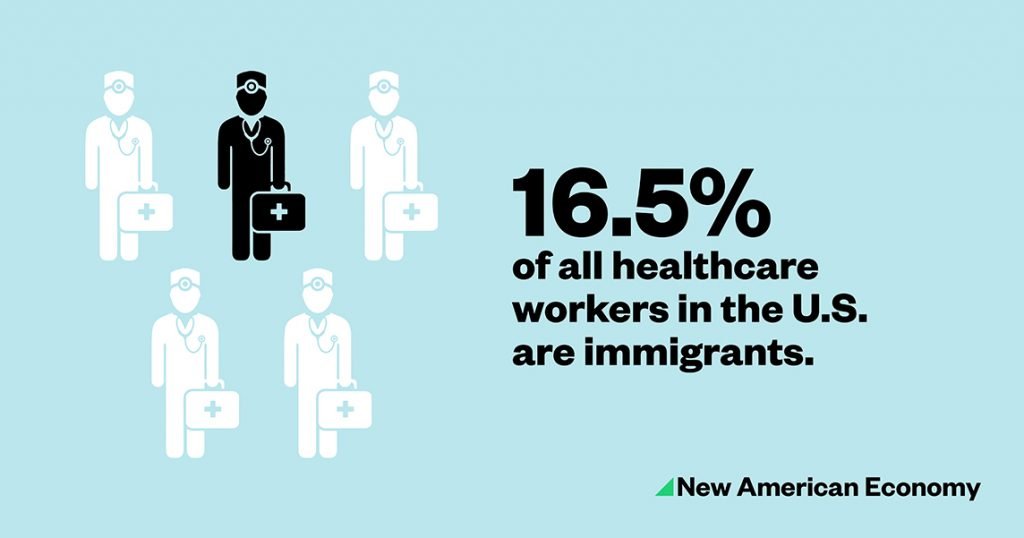By: New American Economy – April 26, 2020
This week, President Trump announced a new Executive Order suspending much of immigration to the United States for 60 days, a move that ignores the pivotal role immigrants are playing to contain the virus, care for the sick, and set up an economic recovery. NAE data proves this point — check out the Immigrants and COVID-19 Portal with the latest data on the role immigrants are playing on the front lines. If you represent a local community, apply for NAE research to inform and support your local efforts in crafting, advocating and/or fundraising for immigrant-inclusive emergency response initiatives.
Here’s what we found this week:
Immigrants are Working in Key Healthcare-Related Industries (Medical Research, Medical Manufacturing, Pharmaceuticals and Pharmacies, etc.):
- 1 in 4 workers (or 132,000 people) in the pharmaceutical and medicine manufacturing industry that develops and produces vaccines and drugsis an immigrant. About half of these immigrants have an advanced degree, and a fifth of them are scientists.
- In the medical equipment and supplies manufacturing industry, immigrants are 24% of the workforce (nearly 149,000 people). Close to half of these immigrant workers have a bachelor’s degree or higher.
- In pharmacies and drug stores, more than 15% of all workers (more than 142,000 people) are immigrants. This sector is even more reliant on immigrant workers in several states, including New York, where about 27% of this workforce is foreign-born.
TPS (Temporary Protected Status) Holders are Working in Healthcare and Other Essential Industries:
- More than 16,000 TPS holders work in the healthcare sector, including more than 6,200 health aides, 1,200 physicians and surgeons, and 500 nurses.
- 13,400 TPS holders work in the hotel and travel accommodation industry.
- More than 34,000 TPS holders work in the restaurant or food service industry.
Refugees are Key Members of the Healthcare and Essential Industry Workforce, especially in some states:
- More than 161,000 refugees work in the healthcare sector in the United States. This includes almost 39,000 in California, 13,500 in Texas, 13,000 in Minnesota, and more than 11,000 in New York.
- More than 170,000 refugees work in industries that are part of the American food supply chain, including in agriculture, food processing, deliveries and shipping, groceries, and food preparation and services. In California alone, there are 32,800 refugees in the food supply chain, in Texas, that number is almost 15,000, and in Minnesota, it’s nearly 9,000.
- Refugees are critically important to some key industries in the food chain, like the 9,000 who are butchers and meat cutters, and the more than 14,000 cooks and chefs across the United States.
“This data is yet more evidence that immigrants don’t threaten America—immigrants strengthen America,” said Mike Bloomberg, co-founder of New American Economy. “While some have tried to blame them for this virus, with Asian-Americans facing ugly attacks, the reality is that immigrants are working day and night to find the cure. In fact, almost one-in-four employees in the industries producing the vaccines and drugs that will bring an end to this pandemic immigrated to our country.”
Upcoming research will include a look at how the economic fallout of the COVID-19 crisis is disproportionately affecting immigrants and how this could have negative impacts on the national economy as a whole. We’ll also provide in-depth check in with the labor markets using data from Burning Glass Technologies.
Need some data you don’t see? Reach out anytime. In today’s uncertain world, we are committed to being a partner, a resource, and an ally to all of you. Stay safe and healthy.
Thanks for your support,
Jeremy Robbins
Executive Director
New American Economy
Source: New American Economy





